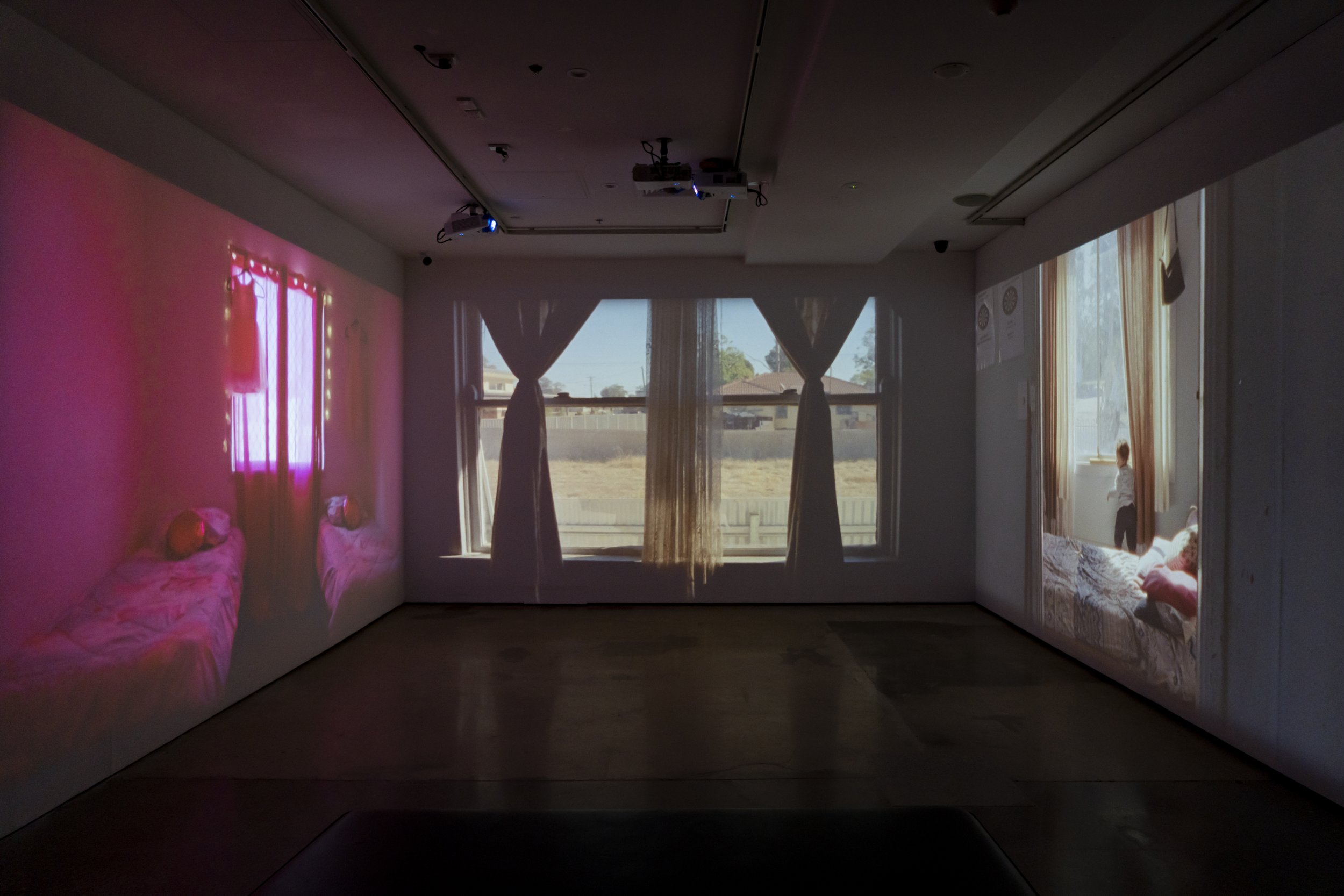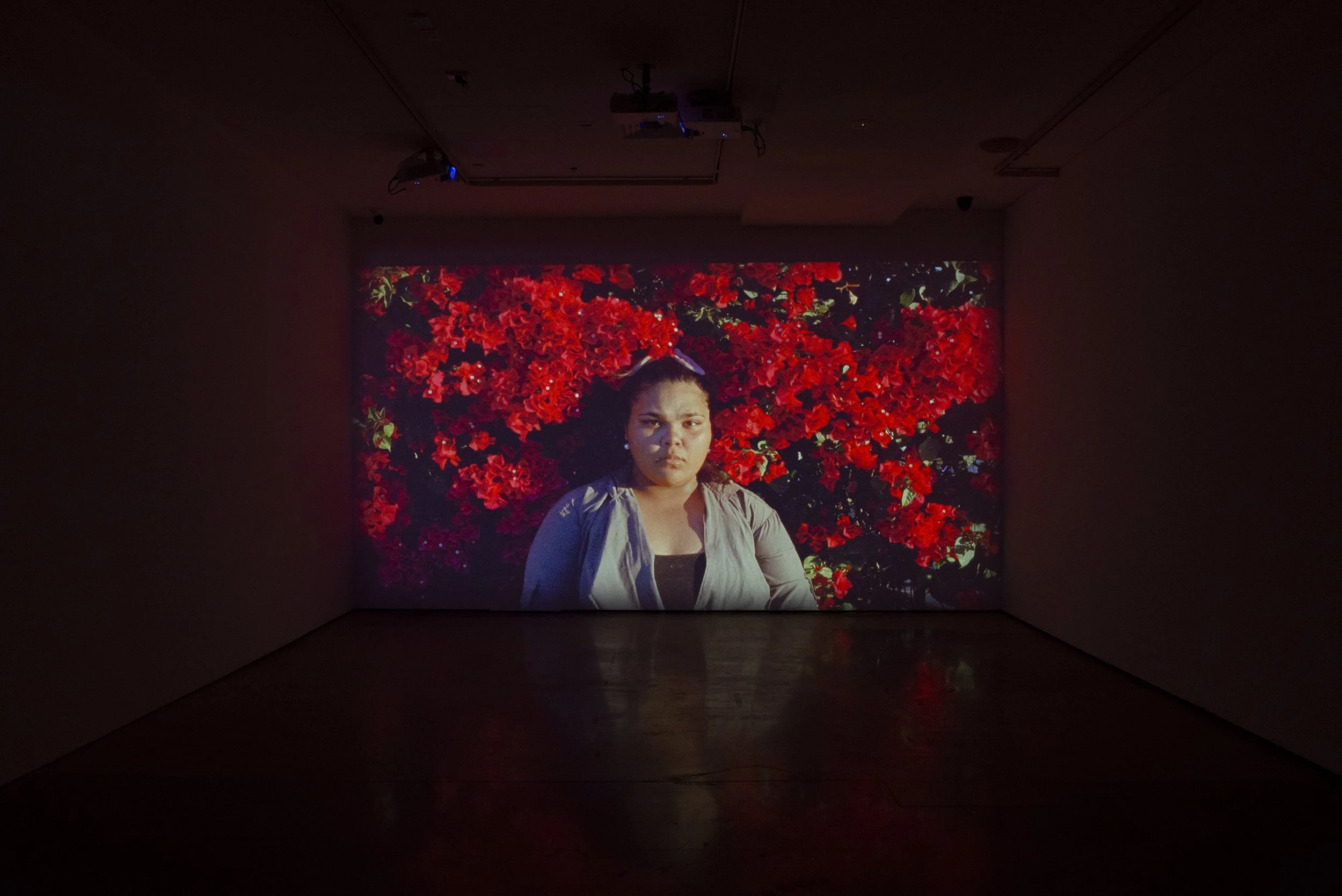It's hard to celebrate a birth when you know what's coming. Still, Rowrow smiled as she lay in a hospital bed, 38-weeks pregnant with her fourth child. Her green prison-issued uniform sat carefully folded next to her—two corrective service officers hovered nearby. At 9:20pm, we heard baby John's first cries, and I cut his cord. Four days later, holding back tears in her eyes and breasts full of milk, Rowrow was handcuffed and transported back to prison without him. The next morning my newborn godson and I travelled eight hours by train so he could be with family. Seven weeks later, in a gesture of cruelty, only bureaucracy could invent, Rowrow was released early on bail. Just eleven weeks later, Rowrow was pipelined back to prison—again five months later—three months later—and several times more. Like a revolving door, her sentence a little longer, and the paper trail a little thicker than before—"carceral tactics and operations…rooted in colonial white supremacy"[1].
HOMEtruths marks an extension of our fifteen-year project, ‘You’ll Know It When You Feel It’, as several co-creators and I venture into moving image. This project has emerged from our lived experiences where we have seen our sisters, brothers, friends, partners, and extended family move through the prison system. However, in recent years, our lives have increasingly intersected with the prison system—often in violent and explicit ways. Although, carcerality extends far beyond prisons, parole, and courtrooms. Systems of surveillance, classification and control are embedded within archival practices.[2] These bureaucratic procedures and subsequent documents often provide the “evidentiary basis to legitimi[z]e the power to punish”.[3] Yet, what remains forgotten within the administration, arbitrary decision-making, paperwork, court documents, police statements, criminal indexes and case files that record these experiences are “the intimate relations, family connections, social networks and public lives of those directly impacted” by the Prison Industrial Complex [4].
In recognising that forms of documentary practice are complicit in maintaining this regime, we felt other creative forms of representation could express the intimate dimensions of our lives as we navigated carceral bureaucracies and surveillance. From six-minute monitored prison phone calls to handwritten letters that circulated between us, we began to collect evidence of this time beyond the bureaucratic documents that otherwise represent this experience. Co-created over five years (2017-2022) under various states of “un/freedom”[5] HOMEtruths draws from our co-created archive to resist bureaucratic representations of women whose intimate relations extend across carceral geographies. In turn, the multi-channel video work serves as a non-linear platform to amplify feelings of intimacy, frustration, kinship, and connectedness that circulate between imprisoned people and their loved ones.
Credits:
Raphaela (Rosie) Rosella with Dayannah Baker Barlow, Kathleen Duncan and Tricia Whitton in collaboration with: Caroline Atkinson (advisor), Emily Avila, Boyd Britton (producer), Charlie Brown, Michelle Brown, Rowena Brown, Tearna Brown, Keith Baker, Zach Baker Barlow (location sound assistant), Daylene Barlow, Hannah Barlow, Rachael Barlow, Daniel Boney, Harry Boney, Kevin Boney, Rachel Choi, Rose Connors, Mike Copeland, Shanika Copeland, Shonny Copeland, Jemma Craigie (community project manager), Adam Duncan, Audie Duncan, Cassie Duncan, Dannielle Duncan, Jakhalia Duncan, Jennifer Duncan, Baby John Duncan, Kayla Duncan, Linda Duncan, Lisa Duncan, Mitchel Duncan, Aunty Paula Duncan (advisor), Paula Duncan (advisor), Uncle Peter Duncan (dec), Sandra Duncan, Shamira Duncan, Shane Duncan (location sound assistant), Aunty Shirley Duncan, Liza Faktor, Edward Fernando, Hailey Fernando, Hayden Fernando, Matari Fernando, Nariah Fernando, Nazariah Fernando, Shaelara Fernando, Tristen Fernando, Tyrese Fernando, Tommy Fing, Jacob Flanders, Lintarli Flanders, Marley Flanders, Christopher Graham, Monique Graham, Tyeira Haines, Bradley Hamilton (location sound assistant), Troy Kemp, Ty-Leta Kemp, Debbie Kilroy (advisor), Barrajai Lasserre, Travis Leslie, Jalika Leslie, Kyesha Nayden, Jakey Nicholls, Jessie Pitt, Baby Alessio Perrigo, Lattiesha Nicholls, Cyril Smith Kiara Smith, Malika Smith, Yogi Swan, Shataiya Swan, Mallana Duncan Taylor, Robert Taylor, Marsha Tighe, Tika Tighe, Mika Tyson, Shakira Tyson, Rachael Tyson, Trevor Tweeton (co-editor), Adric Watson (cinematographer and co-editor) Les ‘Welshy’ Welsh, AJ Whitton, Ashanti Whitton, Jennifer Whitton, Peter Whitton, Nabby Whitton (location sound assistant), Lance Whitton jr, Lance Whitton snr, Laurinda Whitton, Shavanni Whitton, Shiralee Whitton, Alan Widders, Kaylan Widders, Joshua Wilkinson (sound design and location recordist), Brayden ‘Red Bull’ Williams, Wonna Barlow Williams.
Primary Sponsor: Rachel Verghis
Additional Support by: Australia Council for the Arts, Photographic Museum of Humanity, Ian Potter Cultural Trust, Beyond Empathy, John Weiley and Adrian Williams.
References:
[1] McKinnon, “Enduring Indigeneity and Solidarity in Response to Australia’s Carceral Colonialism.”, 695.
[2] Azoulay, Civil Imagination: A Political Ontology of Photography; Sekula, “The Body and the Archive.”; Sontag, Regarding the Pain of Others and Sealy, Decolonising the Camera: Photography in Racial Time.
[3] Sutherland, Tonia. “The Carceral Archive: Documentary Records, Narrative Construction, and Predictive Risk Assessment.” Journal of Cultural Analytics June 4 (2019), 15.
[4] Fleetwood, Marking Time: Art in the Age of Mass Incarceration, 15.
[5] Ibid., 25.




